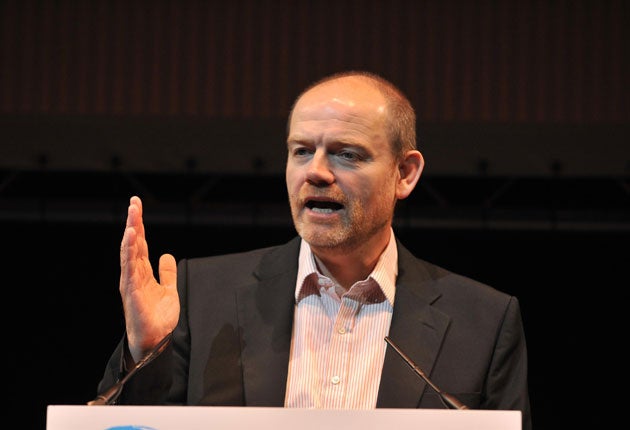Go global or face huge cuts, says BBC boss
Director general follows his MacTaggart lecture with a warning of the consequences of not tackling the corporation's £2bn deficit

Your support helps us to tell the story
From reproductive rights to climate change to Big Tech, The Independent is on the ground when the story is developing. Whether it's investigating the financials of Elon Musk's pro-Trump PAC or producing our latest documentary, 'The A Word', which shines a light on the American women fighting for reproductive rights, we know how important it is to parse out the facts from the messaging.
At such a critical moment in US history, we need reporters on the ground. Your donation allows us to keep sending journalists to speak to both sides of the story.
The Independent is trusted by Americans across the entire political spectrum. And unlike many other quality news outlets, we choose not to lock Americans out of our reporting and analysis with paywalls. We believe quality journalism should be available to everyone, paid for by those who can afford it.
Your support makes all the difference.EastEnders set in a Brazilian favela, perhaps, or an American actor playing Doctor Who? This could be the future of programmes in a new, leaner BBC described yesterday by its director general, who is this weekend wrestling with critical press, worried staff and the threat of a reduced licence fee.
The public broadcaster faces a pension deficit of up to £2bn and future partnerships with American producers in order to make programmes like Wallander to sell around the world, according to Mark Thompson.
He outlined his vision of a smaller BBC yesterday after a pointed MacTaggart lecture in which he said salaries would be reduced and that no star's job was safe in "a period of gut-wrenching change". His MacTaggart speech attacked the Murdoch family's BSkyB for not investing enough in British programming and said that it should pay "retransmission" fees to air ITV, Channel 4 and Five – a riposte to James Murdoch, who last year described the BBC as "unaccountable", "dominant" and "chilling".
At a session at the MediaGuardian Edinburgh International Television Festival yesterday, Mr Thompson revealed that the deficit in the BBC's pension scheme is similar to the value of BBC Worldwide. "The scale of what we are talking about is large because of the character of final-salary pension schemes, with a deficit of between £1.5bn and £2bn," he said. "We have to make changes. It's difficult, but the issue is affordability."
Mr Thompson made light of the controversial move of staff from London to a new centre in Salford, saying that while it was "not quite a non-issue", concerns will soon seem inconsequential. "Salford is a big idea, a place where 2,500 people are making some of the best TV in the world in a centre which is absolutely state of the art. I don't think in five or 10 years anyone is going to remember any of this. I honestly believe Salford will be judged on its success when it is up and running and this is going to be utterly forgotten by the time we get up there."
Krishnan Guru-Murthy, the Channel 4 News presenter who was interviewing Mr Thompson, argued that it was "not a non-issue" and said that some people on Twitter reacted instantly with anger.
Although Mr Thompson claimed he was not responding to James Murdoch's call to cut the BBC, he outlined dramatic cuts including reductions of more than 10 per cent in pay. "You will see things happen at the BBC and it won't just be drama but the website, where we are talking about a reduction in spend of 25 per cent and significant editorial change. We are reducing the hours of what we make and the pages on our website – and, with iPlayer, there are lots of ways in which people can enjoy that."
"It is a moment for realism for the BBC," he said, responding to suggestions that the licence fee will be reduced.
He acknowledged that the BBC has been losing viewers year on year and said it needs to aim for an international role to generate more revenue, mentioning successes such as Wallander, Doctor Who and international versions of Strictly Come Dancing such as Dancing with the Stars and a Hindi version. "Drama is key, and there are very interesting possibilities. UK audiences are much more comfortable with outstanding programming with some element of global casting or global settings. The parochialism is much less. We are going to have to do it and it is going to be more acceptable to audiences. The public is open-minded about settings.
"We should [also] start working together – BBC, ITV and indies in strategic partnerships with the right American producers. There are opportunities, particularly in the cable space, and what works everywhere in the world are strong flavours."
Join our commenting forum
Join thought-provoking conversations, follow other Independent readers and see their replies
Comments